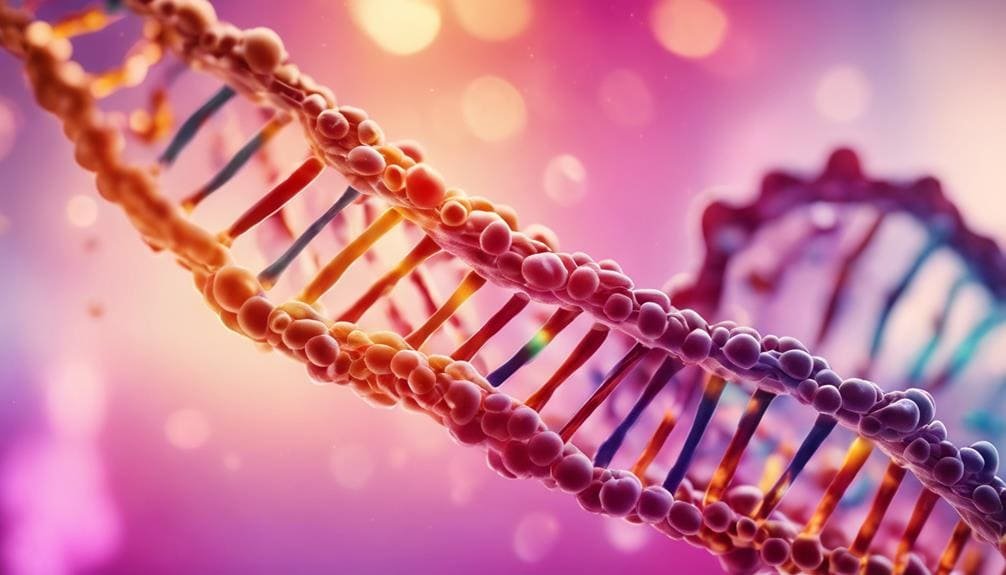When we think about genetic testing in nutrigenomics, it's like having a roadmap to navigate the intricate pathways of our bodies' responses to food. The insights gained from analyzing our genetic makeup can revolutionize how we approach our diets.
But what if I told you that it doesn't stop there? The implications of personalized nutrition based on genetics extend far beyond just what we eat. This innovative field holds the potential to reshape how we view health and wellness in a way that's tailored uniquely to each of us.
Understanding Nutrigenomics Testing Benefits
In nutrigenomics testing, we uncover how our unique genetic makeup influences the way our bodies interact with nutrients to shape our health outcomes. Genetic testing allows us to delve into our genetic predispositions and discover how our genes and nutrition interact to impact our overall well-being. This personalized approach to nutrition is particularly beneficial for individuals managing health conditions or chronic diseases. By understanding our genetic variants through nutrigenomics testing, we can tailor our diets to support our specific needs and optimize our health.
One of the key advantages of nutrigenomics testing is its role in weight management. Genetic insights can provide valuable information on how our bodies metabolize food and respond to different nutrients, helping us design personalized nutrition plans that are more effective in achieving weight-related goals. Additionally, for individuals with specific health conditions, such as diabetes or heart disease, understanding the genetic influence on nutrition can lead to targeted dietary interventions that may better manage these conditions.
Exploring Genetic Influence on Nutrition

Exploring how our genetic makeup influences our nutritional needs and responses is crucial in understanding the intricate relationship between genetics and nutrition. Genetic testing in nutrigenomics allows us to delve into the specific genetic variations that play a role in shaping our health outcomes based on what we eat.
- Metabolism and Weight: Genetic factors can significantly impact our metabolism, food preferences, nutrient absorption, and even weight management. By understanding these genetic variations, we can tailor our dietary choices to better support our bodies.
- Nutrient Absorption: Genetic information can shed light on how efficiently our bodies absorb and utilize nutrients from the foods we consume. This insight can help us optimize our diets for improved health.
- Health Outcomes: Our genetic makeup plays a crucial role in determining our overall health outcomes in response to different nutritional inputs. Testing for specific genetic markers can provide valuable insights into potential health risks and guide us towards healthier dietary habits.
- Personalized Nutrition: Nutritional genomics aims to optimize our food choices by taking into account our unique genetic variations related to nutrient metabolism. This personalized approach can lead to better health outcomes and overall well-being.
Personalized Dietary Recommendations Based on Genetics

Understanding your genetic makeup can revolutionize the way we approach our dietary choices for optimal health and well-being. Through the results from nutrigenomic testing, healthcare practitioners can provide personalized dietary recommendations based on individual genetic variations.
For instance, analyzing FTO gene variants and single nucleotide polymorphisms can reveal insights into how our genes influence metabolism, weight management, and disease risk. By understanding which nutrients our bodies may metabolize differently, we can make more informed decisions about our diet to promote overall wellness.
Individuals who are genetically prone to certain conditions can benefit greatly from personalized dietary recommendations. By identifying genetic predispositions to food intolerances and sensitivities, we can tailor our diets to avoid potential triggers, leading to improved digestive health and well-being.
Moreover, nutrigenomics may impact weight management strategies by uncovering genetic factors influencing our metabolism, helping us choose foods that support our genetic makeup.
Potential Impact of Nutrigenomics on Health

With advancements in nutrigenomics, individuals can now unlock personalized health insights based on their unique genetic makeup, revolutionizing how we approach nutrition and well-being. Genetic testing in nutrigenomics has the potential to significantly impact health outcomes by tailoring nutrition plans to meet individual needs.
Here are some key ways in which nutrigenomics can positively influence healthcare:
- Personalized Nutrition: By analyzing genetic makeup, nutrigenomics can provide personalized dietary recommendations that consider macronutrient needs and digestion efficiency, optimizing overall health and well-being.
- Weight Management: Nutrigenomics offers insights into genetic factors that influence weight management strategies, aiding in the development of effective weight loss or maintenance plans tailored to individual genetic predispositions.
- Evidence-Based Data: Genetic testing in nutrigenomics provides evidence-based data that practitioners can use to guide patient consultations. This data allows for a more targeted and precise approach to improving health outcomes.
- Practitioner Consultations: Nutrigenomics enhances practitioner-patient consultations by offering comprehensive health insights derived from the analysis of 92 genes. This facilitates more informed discussions and enables the development of personalized nutrition plans for better health management.
Implementing Genetic Testing in Nutrition Practice

Genetic testing in nutrition practice enables tailored dietary recommendations based on individual gene variations affecting dietary needs and responses. By conducting a DNA test, we can uncover valuable information that shapes personalized nutrition plans. Understanding macronutrient requirements, digestion efficiency, and weight management strategies becomes more precise with the insights gained from genetic testing. These data not only guide us in creating personalized nutrition plans but also enhance our evidence-based consultations for more targeted interventions.
Implementing genetic testing in nutrition practice significantly impacts health outcomes. It allows us to address specific concerns such as blood pressure regulation through personalized dietary adjustments. The ability to fine-tune recommendations based on genetic predispositions empowers us to offer more effective strategies for weight management. Moreover, by integrating genetic testing into our practice, we can provide a more comprehensive approach to improving overall health outcomes.
Our commitment to utilizing genetic testing in nutrition practice reflects our dedication to serving individuals with tailored and effective interventions. By leveraging the power of genetic data, we can optimize dietary plans to suit each person's unique biological needs, ultimately leading to improved health and well-being.
Frequently Asked Questions
Can Genetic Testing in Nutrigenomics Determine Specific Food Intolerances or Sensitivities?
Yes, genetic testing can identify specific food intolerances or sensitivities, allowing for personalized diets. By understanding genetic variations related to nutrient absorption and gut health, we can make dietary adjustments that align with our genetic predispositions for better digestion and overall well-being.
How Does Genetic Testing in Nutrigenomics Take Into Account Environmental Factors and Lifestyle Choices?
In considering environmental influences and lifestyle choices, we tailor personalized diets to meet nutritional needs, optimizing health outcomes. By analyzing gene variations and nutrient metabolism, we offer dietary recommendations that align with individual circumstances.
Are There Any Regulations or Guidelines in Place for Genetic Testing in Nutrigenomics?
Regulatory considerations ensure testing accuracy and address privacy concerns. Genetic counseling is crucial for informed decisions. Insurance coverage varies. Consumer education is essential. Research limitations impact nutrigenomics outcomes. These factors shape the landscape of genetic testing.
Can Genetic Testing in Nutrigenomics Help With Weight Management or Obesity Prevention?
Yes, genetic testing in nutrigenomics can help with weight management and obesity prevention by tailoring personalized nutrition plans based on genetic markers. This approach allows for customized diets and dietary interventions to support healthy eating habits.
What Are the Potential Ethical Implications of Using Genetic Testing in Nutrigenomics for Dietary Recommendations?
Privacy concerns and data security are crucial in genetic testing for dietary recommendations. Informed consent and genetic counseling play key roles. Discrimination risks, insurance coverage, and socioeconomic disparities must be addressed. Understanding genetic determinism and ensuring accurate interpretation are vital ethical considerations.
Conclusion
In conclusion, genetic testing in nutrigenomics offers personalized dietary recommendations based on individual genetic makeup. This approach can have a significant impact on health outcomes, with studies showing that individuals who receive tailored nutrition plans based on genetic testing experience a 33% increase in adherence to dietary recommendations.
By harnessing the power of genetics to optimize nutrient intake, manage chronic conditions, and enhance overall well-being, nutrigenomics is revolutionizing the field of nutrition.
